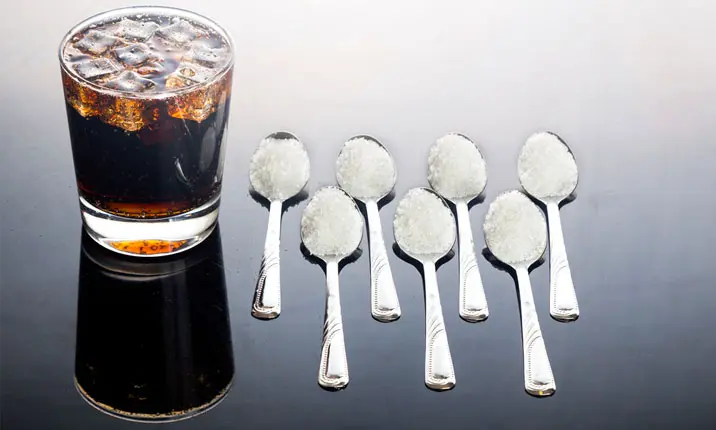Let's take a closer look at the effects of processed sugar, especially sweetened or sugary drinks, on our colon health.
What are sugary drinks?
Sugar-sweetened beverages are drinks that contain added processed sugar or other sweeteners (for eg. high fructose corn syrup, sucrose and more). They include:
- Soft drinks
- Artificially flavoured juice drinks
- Energy drinks
- Sweetened tea with condensed milk
- Bubble tea
As a category, these beverages are the single largest source of calories and added sugar in our diet. Consumption of these drinks is rising in recent years due to beverage marketing and convenience.
How much sugar is in a typical sugar-sweetened beverage?
On average, you should not consume more than 6 teaspoons of sugar, the equivalent of 24g, a day. As you may suspect, sugar-sweetened beverages contain far more than the daily recommended amount of sugar. Here's a breakdown of how much sugar is in one serving of these drinks:
- Soft drinks: 39g
- Artificially flavoured juice drinks: 20 – 26g
- Energy drinks: 41g
- Sweetened tea with condensed milk: 22g
- Bubble tea: 54g
Can heavy consumption of sugary drinks increase the risk of colorectal cancer?
Prolonged consumption of sugary food and drinks can increase blood sugar levels, which lead to insulin resistance. This can raise your risk of colon cancer – as well as other cancers like kidney cancer.
The rates of colon cancer among the younger age groups are on the rise, and a new study has shown that drinking too many sugary beverages may be to blame.
A recently published Nurses' Health Study II showed that women who drank 2 or more sugar-sweetened beverages per day had double the risk of developing colon cancer before the age of 50, compared to women who consumed 1 or fewer sweetened beverages per week.
This study included more than 95,000 nurses, aged 25 – 42 when the study first began in 1989. The women provided information on their diet every 4 years for nearly 25 years. 41,272 women reported on what and how many sugar-sweetened beverages they drank in their teen years. In the 24 years of follow-up, 109 women developed colon cancer before turning 50.
Having a higher intake of sugar-sweetened drinks in adulthood was associated with a higher risk of colorectal cancer, even after researchers controlled other confounding factors that contribute to colon cancer risk such as personal family history. This risk was doubled when women consumed sodas and other sugary drinks during their teen years. Specifically, each serving of sugar-sweetened beverage consumed daily in adulthood was associated with a 16% higher risk of colon cancer. Conversely, for women aged 13 – 18, each sugar-sweetened beverage consumed had a 32% increased risk of developing colon cancer before 50.
Limiting the consumption of sugary drinks, in young people especially, will be beneficial for public health and it can also help to minimise our risk for colorectal cancer.
The rates of colorectal cancer in people under 50 have increased sharply in recent years. Compared with people born around 1950, those born around 1990 have twice the risk for colon cancer and 4 times the risk for rectal cancer.
Due to the rise in colon cancer in young people, the American Cancer Society now recommends those aged 45 and above, and have average risk for this disease to go for regular screening. If you suspect that you might have colon cancer, do make an appointment with your doctor to undergo a colonoscopy screening.
What is the potential impact of sugary drinks on your colon health?
Sugar is well known for its pro-inflammatory effects on the body. Recently, more and more data from animal studies points to sugar's harmful effects on the gut's bacterial environment.
Sugary drinks can eliminate the beneficial bacteria in the human gut, and the resulting imbalance can cause increased cravings for sugar, which in turn further damages the gut. This gut inflammation can irritate the gut, damaging the protective mucus layer and decreasing the amount of good bacteria.
A 2016 review found that artificial sweeteners can also affect our gut motility (the ability of food to pass through it) and worsen the effects of gastrointestinal disease, particularly irritable bowel syndrome.
The rise in inflammatory bowel diseases incidences over the last few decades parallels the rise in consumption of high-fructose corn syrup (HFCS), which is the leading sweetener in soft drinks and a variety of processed foods.
In a 2016 study, researchers found a positive association between a "high sugar and soft drinks” eating pattern and risk of inflammatory bowel diseases.
Local newspapers have reported that people in Singapore consume over 1,500 teaspoons of sugar from sugar-sweetened beverages every year. A survey by the Health Promotion Board (HPB) shows that more than 40% of young adults in secondary schools and colleges consume sugary drinks every day. This is likely because these drinks have been a common part of their diet since they were young and are widely available.
Another survey by the HPB also discovered that 28% of parents and caregivers tend to provide sugary drinks to children between 4 – 9 years old once a week.
The frequency at which these drinks are consumed in Singapore goes some way to explain why the incidence of colorectal cancer and other bowel diseases in younger patients has been increasing.
Are you at increased risk of colorectal cancer?
Consuming more than 2 servings of sugary drinks a day can put a person at an increased risk of developing colorectal cancer before turning 50.
How can the risk be reduced?
Here are some practical steps you can take to reduce the risks of colon cancer:
- Reducing your sugar intake as much as possible and avoiding both processed sugars and adding extra sugar to food and beverages.
- Opting for healthier beverage choices such as plain water and green tea (without sugar).
- Maintaining a balanced diet with 3 – 4 portions of vegetables and 1 – 2 portions of fruit per day.
- Choosing wholegrain carbohydrates over white and simple carbohydrates.
- Spreading meal consumption throughout the day, by having 5 small meals over a day.
- Avoiding hidden sugars by reading food labels, avoiding lactose, maltose, fructose, glucose, sucrose, corn/rice syrup.
- Reducing intake of refined carbohydrates such as white rice, rice and pasta as these are absorbed into the body quickly and the effect is similar to taking sugar.
By following a balanced diet and cutting down on sugar, we can lead healthier and more fulfilling lives. If you notice any symptoms of colon cancer, visit your doctor immediately to get screened.















